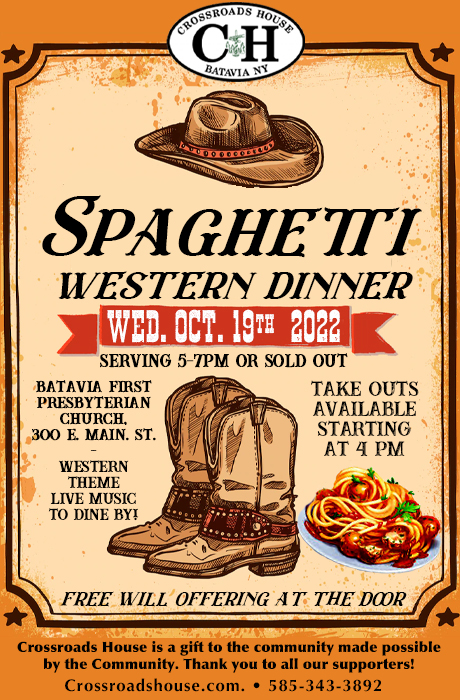crossroads house
February tournaments include 'Super Bowl' singles, Crossroads House, GRUSBC Doubles No-Tap
Mancuso Bowling Center is hosting the annual “Super Bowl” Handicap Singles Tournament this Sunday with one qualifying squad set for noon.
First place in the event, which is sponsored by Red Bull, is $450 based on at least 32 bowlers. One in four bowlers will advance to the head-to-head final rounds.
Entry fee is $45. Handicap is 100 percent of the difference in the bowler’s average and 215 – using the 2021-22 highest United States Bowling Congress-certified average unless this season’s is 10 or more pins higher.
To enter, contact Mark Brown at 716-474-7960.
Other local tournaments during February are as follows:
- Feb. 17-18, “Strike Out for Crossroads House.”
The 27th Annual Betty Ellison Memorial "Strike Out for Crossroads House" No-Tap Tournament returns to Mancuso Bowling Center, with squads at 6 p.m. Feb. 17 and noon and 2:30 p.m. Feb. 18.
Registration fee for the four-person team event is $100. Entry forms are available at the bowling center or on the Crossroads House website – www.crossroadshouse.com.
For more information, contact Vicki Johnson at vickijohnson@crossroadshouse.com or at 585-343-3892.
- Feb. 18-19, Genesee Region USBC No-Tap Doubles.
Letchworth Pines in Portageville is hosting the 3rd GRUSBC No-Tap Doubles event with squads at 1, 2:30 and 4:30 p.m. on both days.
Open to GRUSBC members, the entry fee is $60 per team. One in four teams will cash.
The maximum team average is 420 -- based on the bowlers' highest USBC book average in a league for at least 21 games over the past three seasons, unless this season's average is 10 or more pins higher (for at least 21 games).
To sign up, send an email to mikep@bowlgr.com or call 585-343-3736.
- Feb. 19, Tommy Kress 60-and-Over Tour.
Oak Orchard Bowl in Albion will be the site of the next Tommy Kress 60-and-Over Tour stop.
Check-in begins at 10 a.m. with competition getting started at 11 a.m.
The entry fee is $50. Walk-ins are welcome.
- Feb. 24-26, Ron Riggi Memorial 4-Person Handicap.
Legion Lanes in Le Roy will be conducting the 21st annual Ron Riggi Memorial tournament in honor of the late well-known Le Roy native.
Squad times are 6:30 p.m. Feb. 24, noon and 4 p.m. Feb. 25 and 1 p.m. Feb. 26.
Entry fee is $100 per team and first place, based on 32 teams, is $800. One out of every five teams will cash.
An optional singles tournament will take place, with an entry fee of $5.
To enter, contact Mark Brown at 716-474-7960.
Photos: The first 25 years of Crossroads House celebrated in gala fundraiser at Batavia Downs
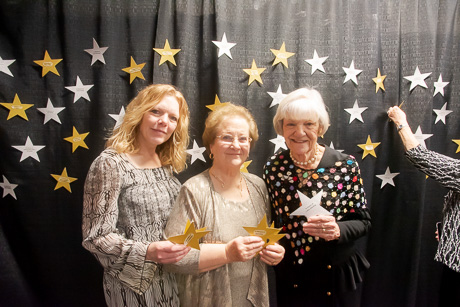
The leadership at Crossroads House often talks about the importance of the volunteers who assist people in their last stages of life. For Cathy Winding, volunteering at Crossroads House saved her life.
"I moved here many years ago, and it was hard," Windings said during the 25th-anniversary celebration of Crossroads Hosue at Batavia Downs on Saturday. "I left my family, my friends. I moved to Batavia, and I found Crossroads House.
"I had read about it in the newspaper, and my mom had passed, then my dad passed, and I wished I had a place like Crossroads House because they had a horrible time."
She said she finds it rewarding to care for the people who stay in Crossroads House.
Julie Tybor, who is also a volunteer, also said it's rewarding.
"Being with other families, spending time with other families has been the most rewarding part," Tybor said.
Tybor, left, and Winding, right, are pictured above with Benita Scoins, with stars from a wall of honor. As part of the event's fundraising event, people could buy stars with names on them, either of people who have passed while staying at Crossroads or of the volunteers they appreciate. Scoins is holding the stars dedicated to family members, including Ron Weimer, who was the first resident of Crossroads House.
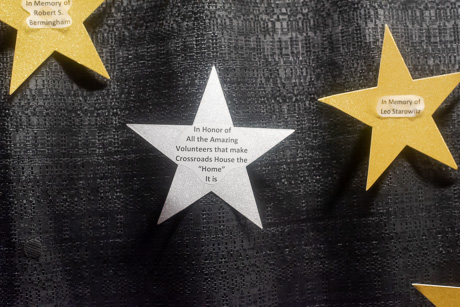
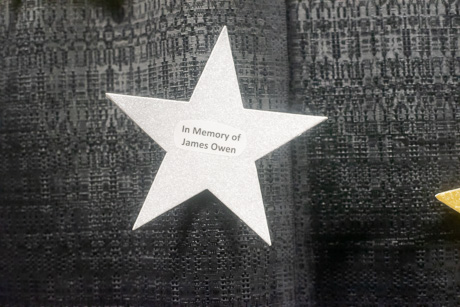
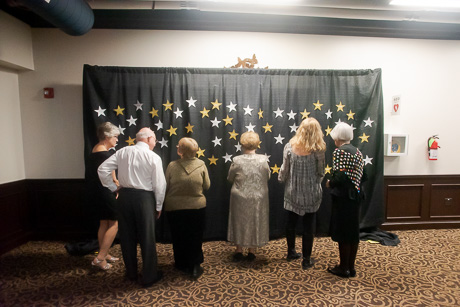
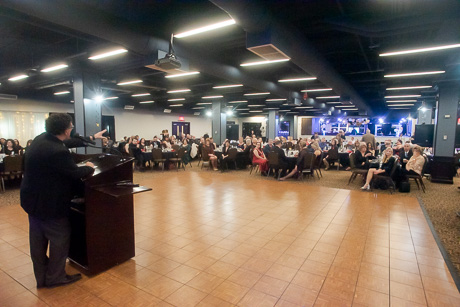
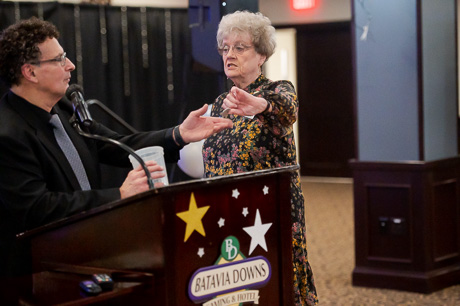
Paul Figlow and Joanne Patri pull numbers in the night's reverse 50-50 drawing -- when you're number is called, you're eliminated from the drawing. When there are only two numbers left, the number pulled is the winner ...
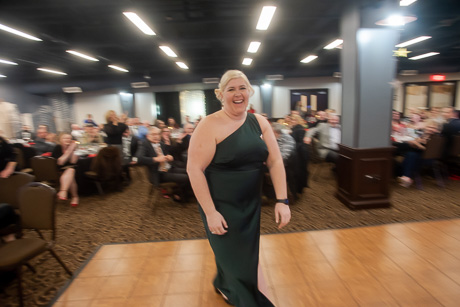
Meghan Gallagher was the winner ...
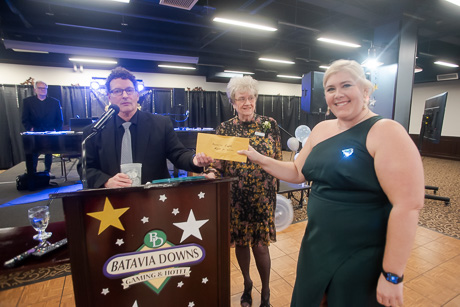
She donated her $600 prize back to Crossroads House.
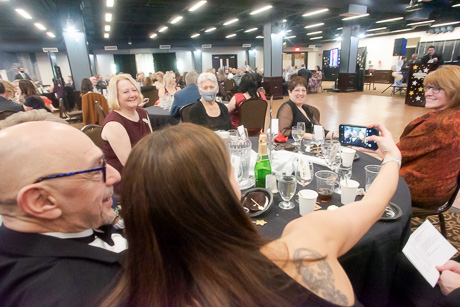
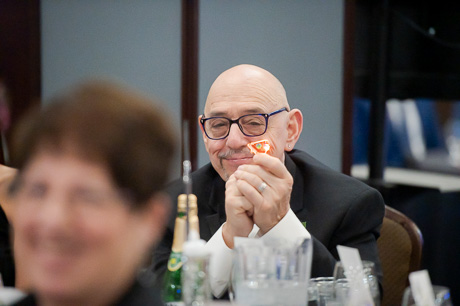
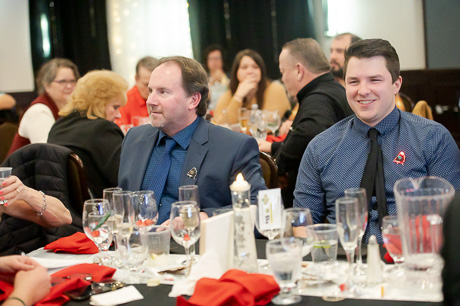
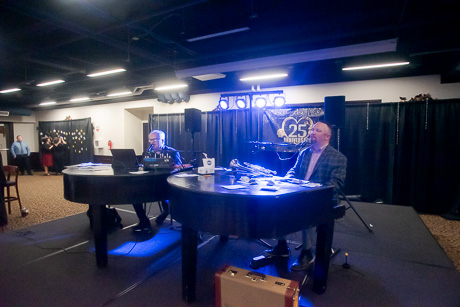
Shine a light on the star in your life at Crossroads 25th gala
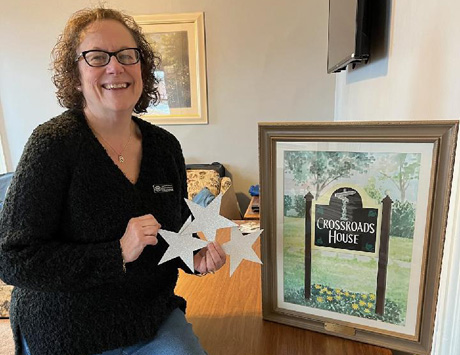
Is there someone who’s the star in your life? They may still be with you, or maybe they've passed. Either way, if their light has been a bright spot that you’d like to recognize, Crossroads House staff is selling tribute stars to memorialize or honor someone special during the nonprofit’s Red Carpet Gala on Jan. 28.
Buy a star (or more) for $25 each, and it will line the red carpeted walkway during the Crossroads 25th-anniversary event. They may be purchased at the house, 11 Liberty St., Batavia, or online at crossroadshouse.com, and do not need to be named after someone who stayed at the comfort care home.
Tickets for the gala dinner are also available for $75 each and include dinner, entertainment, three types of auctions, a 5X7 photo for each couple or group, and $15 Free Play. Doors open at 5 p.m. Jan. 28 at Batavia Downs, Park Road, Batavia.
A VIP sponsorship is $1,000 for a table of eight, and also includes an hour of open bar at 4 p.m., special seating and company advertising throughout the evening.
Auction items include spa packages, romantic getaways, a recliner, and diamond earrings, just to name a few, Director of Development Vicki Johnson said. And people that purchase stars do not need to be attendees of the gala, she said.
Johnson recommends reserving your spot soon, as the event ticket deadline is Friday. Stars may be purchased up to the date of the event.
For more information, call 585-343-3892.
Photo of Crossroads House Director of Development Vicki Johnson showing examples of stars available for the nonprofit's 25th Red Carpet Gala. Photo submitted.
Update: Mayor of Redfield Parkway still smiling, wants to do good in community
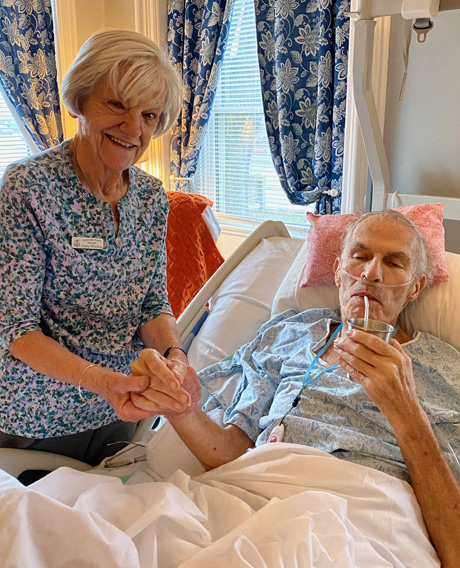
Jim Owen enjoyed a milkshake Tuesday morning and asked The Batavian to take his picture during her visit to see him at Crossroads House.
Owen is no typical City of Batavia resident, and taking his picture has become commonplace amongst local media during special events. So commonplace, in fact, that when he saw a second volunteer, he wanted a picture taken with her as well.
Crowned the Mayor of Redfield Parkway by City Council for his longtime civic and neighborly involvement in the community, Owen has been fighting his most important battle this year: esophageal cancer.
His temporary residency at United Memorial Medical Center brought many visitors to his room, and the flow of people has not stopped at the Liberty Street comfort care home that he moved into more recently. It has been so busy with well-wishers that it has, at times, been hard to keep up with the continuous traffic.
Crossroads staff and friends have been maintaining his online presence and posting updates. This was the latest one:
“Update on Jim, and a reminder from the Crossroads staff. Jim is still resting and being well taken care of at Crossroads House. Visitors are still welcome and very much appreciated; however, we want everyone to know that Jim has grown somewhat more confused over the last several days. The staff feels that the visitors Jim receives are comforting and beneficial to him, but asked us to remind everyone to keep the visits to no more than 15 to 30 minutes in length so he can get his rest.
Again, please do not let this message discourage anyone from coming to visit, but just be advised of the Crossroads House staff wishes which they feel are best for Jim. Thank you, and we will keep you informed of any changes or news.”
Likewise, people have responded with likes, hearts, care emojis and fond messages of encouragement. Visitors may also sign a guest registry and offer words of comfort to Jim, who, despite seeming tired, still has his sense of humor and kindness intact.
During Tuesday’s visit, he said that volunteer Julie Mancuso lives on his street. He then corrected himself to say that “I live on her street.” And as they discussed which street was the best in the city, he gave a thoughtful pause and rephrased it all together.
“The best street is the street you live on,” he said.
He knew this reporter and The Batavian’s publisher — who he refers to as his adopted brother. (Jim’s last name is Owen versus Howard Owens.)
When many people in his situation would be thinking about things they missed out on in life, Jim talked about how he wanted to do more for the community during Tuesday's visit, Owens said.
"He said he always tried to treat people well because 'when you feel good about yourself, you do good things. You make a contribution,'" Owens said. "He said he would like to see a scholarship set up to help people with his disease. Jim Owen has spent his life trying to teach us all to be better human beings, and even now, he's still trying to spread that message."
Jim seems to be absorbed in wanting to help people, help the community, and perhaps even help the world in some way. He described himself as just a pin or cog in the wheel of life, but if he can make at least one person happy, he has accomplished something.
Jim Owen, you have done far more than that. You have reached out to neighbors and friends, shared tidbits of Batavia and Owen family history, garnered support for the naming of the BHS auditorium after your late father Frank E., fought for the restoration of Redfield’s well-known pillars that have served as guideposts to the VA Medical Center, and greeted, supported, chatted with and smiled upon countless folks during your longtime commitment to Batavia and its citizens.
That’s not only worthy of a milkshake and a photo, but also a grateful nod of thanks from your friends and community members.
Mission accomplished.
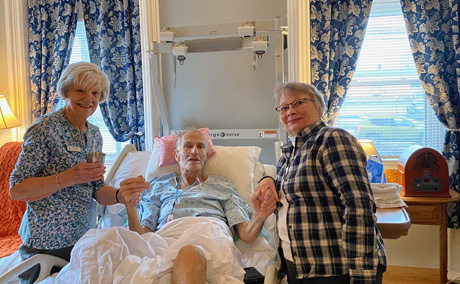
Top photo of city resident and Mayor of Redfield Parkway Jim Owen enjoying a milkshake with volunteer Cathy Winding Tuesday at Crossroads House in Batavia; and above, also with volunteer Gail Wysko. Photos by Joanne Beck.
Gala celebrates 25 years of Crossroads House
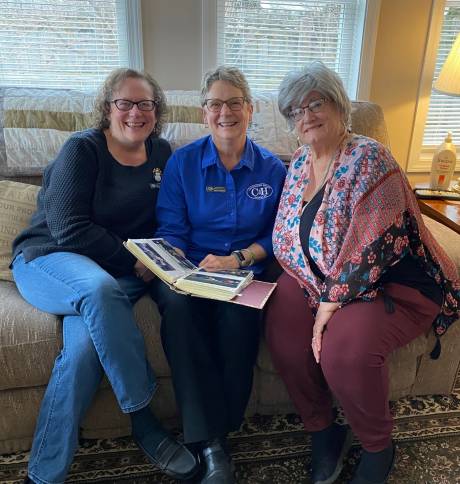
What better way to celebrate your 25th anniversary than a red carpet affair?
That’s exactly what Crossroads House organizers thought. Doors will open at 5 p.m. Jan. 28 at Batavia Downs Park Place Entertainment Center, Park Road, Batavia.
“We’re going to do a lot of celebrating,” Director of Development Vicki Johnson said. “There will be a memorabilia table and photos, and the auctions.”
For musical entertainment, Dueling Pianos International will be performing in a fun, light-hearted style, she said. Patrons can offer tips for a pianist to play a particular song, or to stop playing one, she said.
Going along with that musical theme, the reverse auction includes a piano pin with a flashing light to indicate who is still in during the drawing. Once a number is pulled, the light goes out.
A buffet dinner with cash bar will begin at 6 p.m. The evening will include several auctions in the form of a live one — maybe you’d like to bid on four tickets to see comedian and ventriloquist Jeff Dunham, a comfy recliner, or an overnight getaway — silent auctions of various gift packages and a reverse auction with a cash prize.
Never heard of a reverse auction? It works completely opposite of most raffle drawings, in which participants are eliminated as their numbers are drawn, dwindling down to a final winner. Or perhaps the last two remaining participants will opt to split the cash pot.
Star tributes may be purchased for $25 to honor or memorialize someone special, because, after all, this is a time to recognize the stars in one’s life, organizers said. Past and present employees, volunteers, board members and families served are invited to join in the celebration.
The first resident’s name was Jean, and she moved into Crossroads House on Jan. 7, 1998. A process that took two years and many hands — of staff, volunteers, board and community members — has established a comfort care home for 575 residents, Johnson said. (For the full story, click HERE.)
Future goals are to continue educating the community about the fragile topic of death and to open a second home.
In the meantime, the Red Carpet Gala is an occasion to celebrate the accomplishments and lives that have been touched by Crossroads House.
Tickets are $75 each, which includes dinner, entertainment, auctions, free 5X7 photos for each couple or group, and $15 Free Play. A VIP sponsorship is $1,000 for a table of eight, and also includes an hour of open bar at 4 p.m., special seating and advertising throughout the evening.
“We’re lining our red carpet with stars in memory or honor of someone,” Johnson said. “The board is hosting it, and the goal was really to celebrate.”
Go here for tickets. Seating is limited to 350, and Johnson recommends reserving your spot soon. Stars may be purchased up to the date of the event.
Photo: Vicki Johnson, director of development, Kathy Panepento, founder and director of resident care and doula services, and former nurse Betty James reminisce with a scrapbook of history about Crossroads House. Photo by Joanne Beck.
People, stories, community support and nurturing have been part of Crossroads House for 25 years
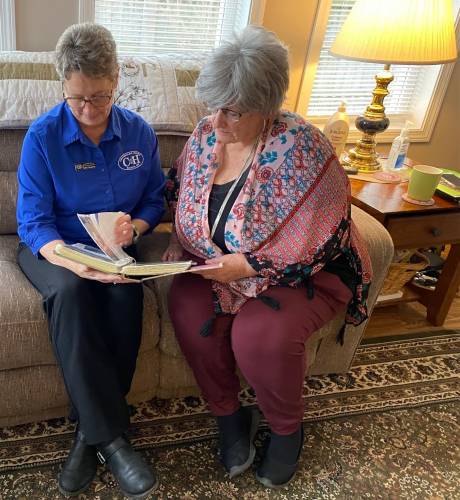
Memories began as a trickle, and soon they were gushing as Kathy Panepento and Betty James recalled the early days of Crossroads House.
There were certainly recollections of how the comfort care home became a fixture in Batavia, but perhaps even more special were the people that filled the beds over the last two and a half decades.
Like the gentleman who had three wishes to not die at his residence, have a beer and watch the Buffalo Bills game scheduled for later that day, Panepento said. He moved into Crossroads, and she went home to get him a beer; however, he died in a short six hours, before the game came on.
“But he got two wishes,” she said.
Crossroads House will celebrate its 25th anniversary with a Red Carpet Gala on Jan. 28 at Batavia Downs. (See related article for details.)
Panepento has been the face of Crossroads as a registered nurse in the hospice field and eventual founder of the site in January 1998. She has worked at Buffalo Hospice and helped to get a hospice for Genesee, and Wyoming County certified, training volunteers and continuously learning about the needs of the community.
She had gone from the OB-GYN field to hospice because “I fell in love with it.”
“You know, it’s such a personal approach,” Panepento said. “So then I got involved with the planning committee with them starting hospice with JD LeSeur and Father Scheider. And I was the first paid employee and training the hospice volunteers … and then getting it to certification and getting it approved by the State Department of Health.”
Filling a need
That was for the two-county hospice program. Panepento observed something about how the medical system was working: people weren’t dying quickly enough, which meant they couldn’t go to a hospital, yet also couldn't safely remain at their own residence, and instead were transferred to a nursing home.
“And a lot of times, they died before the transfer or in an ambulance on the way to the nursing home. So it's like, man, we're missing something. Even though Hospice is a great organization, they're limited in what they can give. So we just need something to fill in that crack there,” she said. “So I had the dream in ’95, my husband will recall: he said, ‘Oh no. What is it now?’ And I said we need to open up a comfort-care home. Batavia does not have an inpatient unit. They don't have a palliative care unit. There's only three beds in Genesee County for people that are dying.”
James, also a registered nurse who lives in Perry, became involved by way of Florida. One of her favorite aunts had been diagnosed with metastatic breast cancer, and James and husband Tom went to Florida to see her. Her aunt was in hospice care at home. And her uncle was “just on edge.”
“There was a knock on the door, and a hospice nurse entered. I could see a visible relaxation of him, and I thought it was just a wonderful thing,” James said. “When I came back, I talked it up. That didn’t go anywhere.”
Then she saw an ad for a nurse at the Hospice of Genesee and Wyoming County and became Panepento’s first hire.
“She had to teach me a lot; you’re going into people’s homes. They’re hurting; it’s more symptom control management,” James said. “God ordained me to this field. You get to know the person and their disease process.”
Panepento had to insert a story about James and a male patient with a king-sized bed. Part of the job is to assist people where they’re at and not move them, so James attempted to care for him. She admitted that she had never seen a bed that big, so it was a challenge to reach him.
“And she fell into bed with him,” Panepento said as she and James broke into a laugh.
“You have to have a sense of humor,” James said, recalling the reaction of her and the man. “We laughed.”
What's in a name?
The name Crossroads came during what the women believe was a divine moment. A group of them was having lunch — a routine event at the Red Osier — and had been trying to come up with a name for this comfort care home in Batavia. James was sitting next to a nurse at one end of the table.
“I said, ‘Oh, that sounds wonderful.’ She said, ‘what, I didn't say anything.’ And I heard it: Crossroads House. And she said, ‘that's it,’” James said. “That was heavenly ordained because I remember there was a God wink. Yes, I like that term.”
Panepento began to cite a Jeremiah verse: “Thus says the Lord: Stop at the crossroads and look around you. Ask for the ancient paths, where the good way is, and walk in it. You will find rest for your souls.”
“I believe that God led us to bring it to reality,” James said.
And over these more than two dozen years, there have been people who came — not to die but to live — out their remaining days at the home on Liberty Street. There have also been families of those 575 residents that settled in to support, and spend time, laugh and cry, and often reconcile old hurts with, a loved one.
There was an older gentleman who was there with his wife. And they were just so tight, James said.
“He was here every morning and he'd sit by her side. Every Thursday, he knew I was working. This is about the connection you get. And he'd come with a bag of (items) for the house. And after she passed, I think he just needed to keep the connection here for a while. Every Thursday, he’d bring things like paper towels … it's just one of the thousand things in my head about this place.”
Over the years, there have been countless stories, and many events, including baptisms, weddings, birthday parties and showers.
Panepento added that families do come back after a loved one has died, “because we nurture them.”
“We've held them up. And you know, they come back, and it's like reunion time,” she said. “We always tell our families, you're gonna adopt the Crossroads House family, but we're gonna adopt you too. You’re family.”
Community support
That nurturing has also come from a supportive community — First Presbyterian agreed to rent a vacant property for $1 a month when nobody knew where and how a home would be established, and well-attended fundraisers and donations have helped to float the nonprofit all these years while it charged nothing for the service.
“What a blessing! Now we had a home that needed extensive repairs, and with no money to start the renovations. Then came more blessings. On two different occasions, we were able to get prisoners to help with the remodeling process. The community came through for us, and area businesses donated building supplies and equipment. We even got volunteers to provide the manual labor,” Panepento said. “Staff was hired, volunteers were trained, the house was named Crossroads House, marketing was begun, and we fund-raised until we knew we had enough operating capital to open our doors and provide our services.”
Organizers themselves also “dug into our own pocketbooks,” James said. It took $7,000 just to get incorporated. As the house furnishings — donations seemed to miraculously fill the void when needed. Learning that a new furnace requiring $800 down was soon followed by a donation of $800. Needs of furniture and appliances often happened the same way. It was as though their needs — often seemingly out of reach — were somehow met time and time again.
Panepento looked up from the sitting room, recalling a huge hole in the roof over the kitchen. It got repaired, and they just carried on, focusing on providing services of care, comfort, and genuine love. More recently, the donation of a handicap-accessible van has furthered the offerings to include outings with residents.
Living at Crossroads
They took in the first resident, Jean, on Jan. 7, 1998. She was a good friend, nurse and mentor whose husband came with their dog and stayed there with her. Jean even helped to train volunteers, giving nuggets of advice such as how to move someone properly. There are even committee meetings conducted in her room to keep her involved.
“So we brought that to her bedside, and she did life,” James said. “And that's when we say you're not here to die. You're here to live until you take that final breath, whenever that may be.”
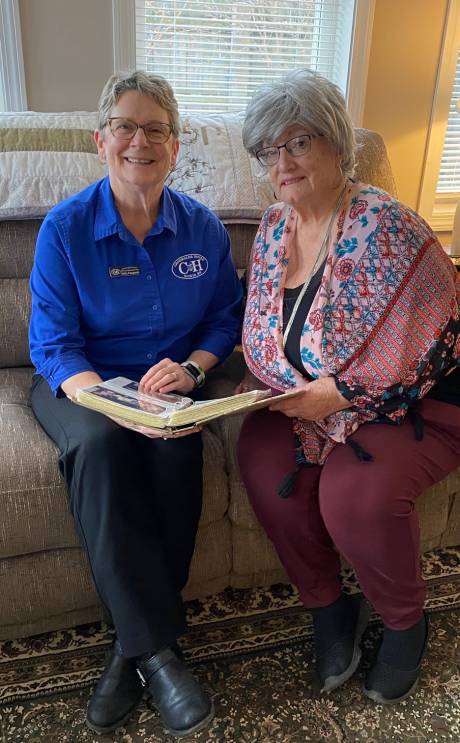
Top Photo: Kathy Panepento and Betty James look at a scrapbook of Crossroads House history at the comfort care home on Liberty Street, Batavia. Photos by Joanne Beck.
Photos: Fall basket raffle to benefit the Crossroads House
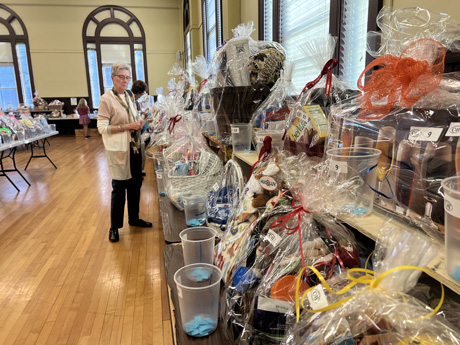
The annual Fall Basket Raffle to benefit the Crossroads house opened today at the Batavia First Presbyterian Church.
Sales of raffle tickets continue tomorrow from noon to 4 p.m. with drawings starting at 3 p.m.
There are 148 baskets to try your hand at winning. The fundraising goal for Crossroads is $9,000.
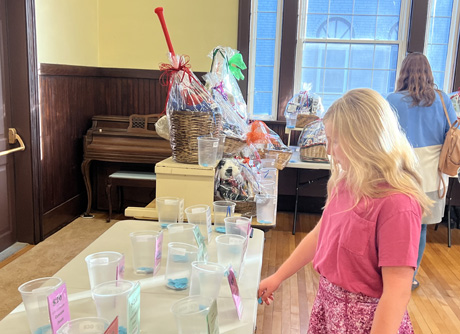
Guest speaker to discuss the potential for healing during process of dying
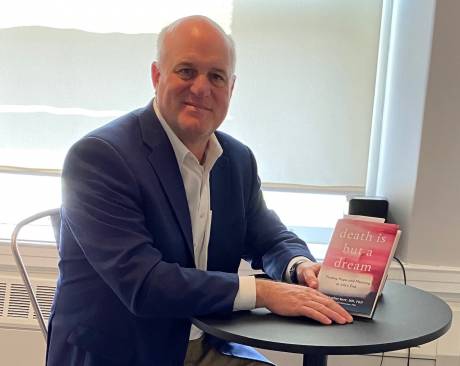
Death is not exactly a sexy topic. In fact, it’s right up there with public speaking as a top fear for many people.
Yet, it’s an inescapable phenomenon, as everyone eventually dies. However, the dying have been shown to have end-of-life healing moments, which are contrary to the medical field, where death has been viewed as “a kind of medical problem to solve,” Dr. Christopher Kerr says.
“So you don't get to step off and see the more humanistic view of it. You're looking at it through medicine, and dying is obviously more than organ failure; it’s closing of life. I think where I'm at after all these years, is a more hopeful interpretation that on the one side, the actual experience of dying is less fear and pain-evoking than people anticipate,” Kerr said during an interview with The Batavian. “So the actual dying process is not defined by the suffering one would imagine, necessarily, and in terms of what people experience at the end of their life, I think there's a more hopeful story, that there's a better version than the one that I had previously, which was there was a finality to it.”
Kerr, author of “Death is But a Dream,” public speaker, researcher and medical doctor, will be talking this week about his book and a related study conducted with 1,500 people at the end stages of life. Hosted by First Presbyterian Church and Crossroads House, the event is set for 6:30 p.m. Thursday at the church, 300 East Main St., Batavia.
Have you ever wondered what happens at the end of life? For years, Kerr had avoided the topic and had no interest in digging around to find such answers. Perhaps it was the death of his father when he was just a child or his medical training that focused so much on the mechanical functions of one’s being that pushed Kerr another way.
In fact, he petitioned to get out of the hospice rotation of his training at the University of Rochester, homing in on a career in cardiology.
“I think I was going through a lot of what young doctors go through, which is that you're so enamored by technical medicine, what can be done with intervention diagnosis, that you lose sight of the other side, which is sometimes your role isn't to cure, but to comfort,” he said. “And so I was too busy on a steep learning curve, enamored by everything in so much to learn, and it was such a rich, enjoyable part of life. But what gets lost in that equation is what the patients actually need you for. And sometimes they just need you not to do things to them, but to be present for them.”
He ended up dropping out of cardiology and his path took him to the exact spot he originally had no interest in: as a hospice doctor. As his book jacket states, Kerr has cared for thousands of people who, “in the face of death, speak of love and grace.” It’s seemingly an oxymoron — a peaceful end-stage patient — however, Kerr believes he witnessed the unseen process of death that involved life-like dreams and visions that provided a spiritual balm for the dying.
He noted how patients would often get visits from late loved ones in their dreams, but not from others who had caused harm or hurt in the past. Patients would describe their experiences as more than dreams, and with a resounding reality. Themes of love and forgiveness emerged, providing a journey from distress to comfort and acceptance, he said.
His talk will include actual videos of study participants, all of whom had tested to be lucid, and how they describe their experiences. The Batavian asked if it was possible they were susceptible to suggestion by being part of the research, and he said there was a bias in that everyone was in hospice. But as for them being influenced by the study, it was the other way around, he said: participants were referred to him because they were already having dreams or visions, he said.
Although these dreams connected patients with loved ones from their past, they didn’t contain much in the way of religious symbols, Kerr said. There was a heaven in some descriptions, but no hell, and not many visions of God or Jesus. These episodes were not “a dry run,” as is the case with people who have died and come back to life. Those people seem to return to life with a renewed mission to learn and become a better person, whereas hospice patients — those who know their end is imminent — make healing connections.
“Somebody wrote that our first and last classroom is our family. And that's what people tend to focus on,” he said. “And that's where we learn the messages of faith, of love, and forgiveness. And that's where they return at the end.”
Not so surprising to animal lovers, pets were a recurring theme as well. These studies — which include interviews and surveys of 750 family members — aren’t just for the dying.
“Their death is also the end of a relationship. So it's often in consideration for their family or their loved one. How you view someone dying absolutely affects how you remember them. And so it's really for both,” Kerr said. “I think people are advocating in this generation and really wanting to say that they don't necessarily want the doctor’s version, (for a patient to be) medicalized or hospitalized. So that's what it's for.
“I like to think that we created room for more discussion to step off of their traditional medical role and viewed as more on the whole. The people who tend to get this are people who are truly at the bedside involved in care, so nurses, nurse’s aides, social workers, and chaplains. This doesn't just pertain to the purview of the physician. This belongs to everybody,” he said. “So I hope we're looking at it differently. I don't think you have to understand where it's coming from, or what the cause is, but you at least have some reverence for it. And I think that's what we find; people who've had personal experiences are pretty moved.”
I think the most important thing is to give people permission. And allowing them to share is often very therapeutic. So I think any time you're unburdening somebody, you're helping them in their journey.
Organizers invite you to “join us as we explore such questions through a presentation” by Kerr that will highlight and validate the powerful dreams and visions often experienced at the end of life. Seating is limited and admission is free. Register HERE.
Dr. Christopher Kerr, author of "Death is but a dream," along with Carine Mardorossian, was part of a research team at Hospice & Palliative Care Buffalo that spent years researching the impact of end-of-life experiences on hospice patients and their families. His next project is about caregivers. Photo by Joanne Beck.
From volunteer to volunteer coordinator, Crossroads staffer has found her niche
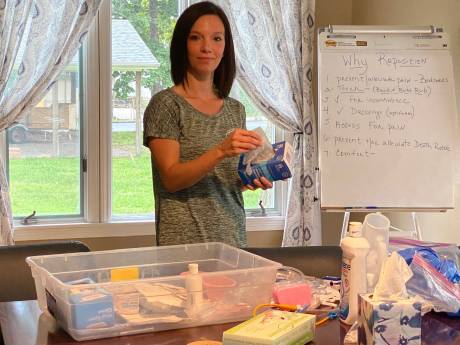
Editor's note: This is the third part of a series about the new staff at Crossroads House in Batavia, which will celebrate its 25th anniversary in January.
Out of all the physical, hands-on training hours that Ashley Manuel conducts for new volunteers, they aren’t usually the most difficult part of the job.
“It’s the emotional,” Manuel said at the Crossroads House training site on East Main Street, Batavia. “I think the physical becomes secondhand. Probably the number one question is, ‘how do I act?’ Sometimes there’s no right thing to say. Yea, the emotional is hard.”
As volunteer coordinator for the nonprofit comfort care home on Liberty Street, the 33-year-old knows how to run through the drills: rolling residents over as needed; properly using an Ergo Nurse to pull them up the bed toward their pillows; and how to use a bedpan, empty a catheter container and swab the mouth.
As for those emotional moments when talking with patients and their family members, feeling the knee-jerk response of tears welling up, and feeling sadness, those aren’t quite so easy to navigate, she said. After all, the people at Crossroads House are usually at the end of their lives. They are called residents, and they’re people with thoughts, feelings, questions, fears, and sometimes unresolved family issues. In other words, they’re human.
“You fall in love with these people,” Manuel of Batavia said. “You sympathize, but it’s hard to rewire … I think it’s our innate nature to want to feed and take care of someone.”
Manuel has been learning her way through the house, as a volunteer, overnight aide and, as of June, volunteer coordinator. She became familiar with Crossroads when her grandmother stayed there in 2016. She saw firsthand what a “good death” can be: filled with the smell of home cooking, the sounds of her four children running around and playing, and a sense of peace in the air.
“Death is inevitable; why not make it a good one?” she said. “It feels more like family (at Crossroads).”
She has been recruiting via social media, a Bring a Buddy program for current volunteers and giving talks during church coffee hours. Of all of those techniques, it often comes down to word of mouth, she said. People just like her who experienced the house firsthand often come back to volunteer. There's always a need for more, she said, and there are many tasks to do besides hands-on care of residents, such as housekeeping, office work, gardening, raking leaves and shoveling snow.
As a volunteer, she was giving of herself, though it didn’t quite feel that way.
“I think I have a caregiver’s heart. I feel I get more out of it than the resident does,” Manuel said. “It’s humbling that they’ll let you take care of them, it’s very sweet.”
People looking at their final days often fall into similar patterns, she said. They will stop eating solid foods, and shift to liquids, popsicles or ice cream — “We eat a lot of ice cream,” she said. “And it kind of dwindles down.”
It isn’t always the resident who becomes most distressed about that regression from life, but the family, she said. Those innate desires to feed and nourish a loved one can be really strong, and it may become more difficult to acknowledge the truth. That’s all part of the education about what happens when the loved one does begin to move away from life-affirming activities, she said.
Taught by Crossroads founder Kathy Panepento, Manuel feels as though she was taught to fish. She has become more confident in her own abilities through Panepento’s experienced advice and now carries that onward to help others, Manuel said.
During family meetings, volunteers emphasize not to push anything on a resident, and that it’s OK to let the process happen. At that point, family members often display a visible sign of recognition, she said.
“That’s when you start to see the demeanor of the family change,” Manuel said. “They’re like ‘wow, this is real … this is happening.’”
She believes that pushing food on someone who is dying is an unnecessary weight, literally and figuratively.
“Food weighs us down,” she said. “The soul is trying to leave the disease.”
Part of the family educational piece is to encourage members to talk — about the good times and the bad times, she said. There are no rules, and there may be issues to deal with, talk about, and ideally resolve. It’s a vastly different atmosphere than a sterile hospital with doctors, IV tubes and machines, and Manuel encourages visitors to act normally, laugh, joke, cry, and get in bed alongside a loved one if prompted to do so. This is an opportunity for families to heal.
“Every family has their (stuff), get it off your chest,” she said.
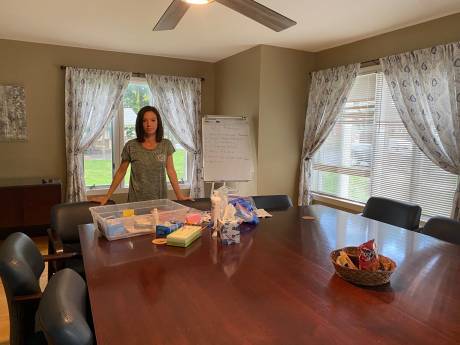
All of what Manuel has soaked up will be wrung out for new volunteers to absorb. She feels fortunate to have the training house rental (a former rectory of St. James Episcopal Church) to conduct group and one-on-one training for all of the needs likely to come up at the actual site. She shows a movie about dying, discusses the origins of Crossroads and makes everyone do what they’re asked to do for residents — sit on a bedpan, run a swab around their mouths, use an oximeter, a gait belt, a denture kit, medicated bandages, Ergo Nurse and be rolled over in bed.
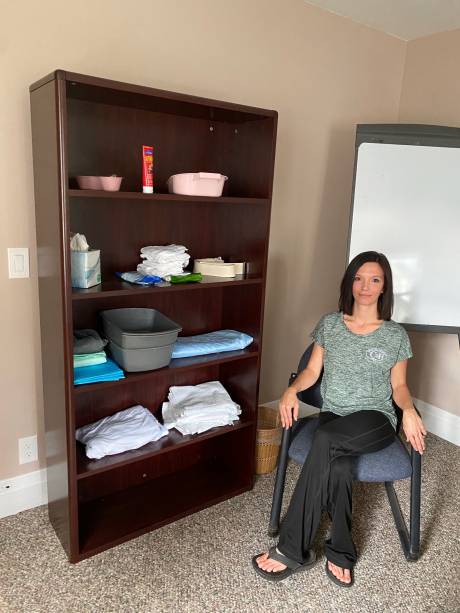
Those lessons definitely involve how to physically perform each exercise, however, Manuel also wants them to grasp the importance of being gentle and maintaining each resident’s dignity throughout the course of his or her stay. And of course, there’s the emotional part.
“I always have the tissues out when we watch the movie,” she said. “We love our volunteers, they do so much. Someone asked me ‘are we allowed to cry?’ Yes. I’ve sat and cried with many families."
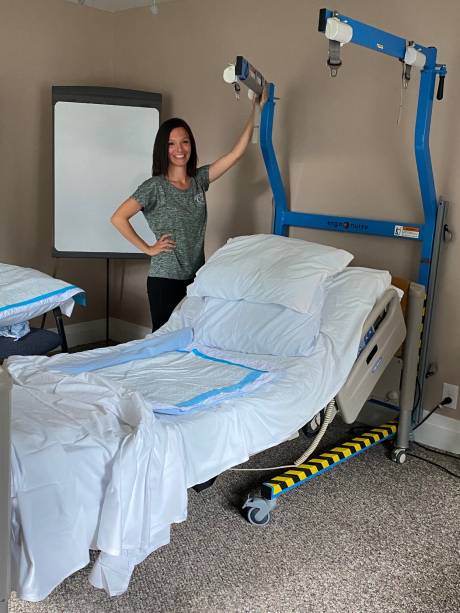
Crossroads House Volunteer Coordinator Ashley Manuel shows some of the items that volunteers learn to use during training at the training home on East Main Street; the home is fully equipped with training materials, supplies, equipment and a bed for ample practice. Photos by Joanne Beck.
Developing relationships, in and outside of the House
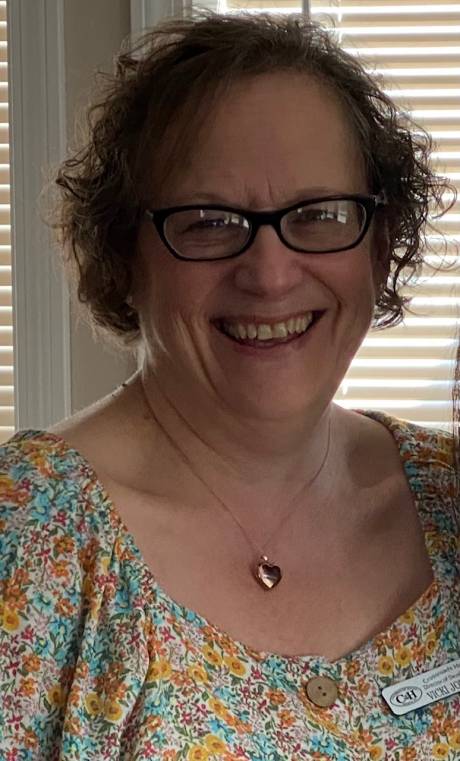
Editor's Note: This is the second of a series about new staff at Crossroads House, which is to celebrate 25 years of existence in January.
She was a friendly face in the main office at Washington Towers for 15 years, and although she enjoyed it, there came a time of burnout, Vicki Johnson says.
She left in May 2021 and eventually decided that “it was just time for me to make a change.”
Johnson began her new role as director of development at Crossroads House on Aug. 1.
“I like working with the elderly. And it's where I just really saw how fragile life is,” she said during an interview at the House on Liberty Street, Batavia. “It can be kind of, you know, you can get a little burnout with dealing with the elderly and disabled. And so this came up and I just knew it was time. Caregiving and Crossroads have always just been something that I feel — like my husband says -- destined to do.”
Johnson provided care for her grandmother Lucy, who was nearly 104 when she died, and for her mom Betty, and now for Aunt Dorothy, who is in a nursing home.
“I think I've always been of that caregiving nature. And just having been with people at end of life. And again, just seeing how fragile life is, you know, in my position at Washington Towers. Unfortunately, over the years, there were numerous people that we did welfare checks on and came upon them that they had passed. We were the first ones that tended to see their decline, whether they were getting dementia or just failing in health, and it's there where I kind of saw the negative part of the family relationships, and how they treat the elderly … it kind of just had me gravitate toward caregiving.”
It was while at Notre Dame High School for about three years that Johnson learned more about development initiatives and fundraising, she said. That shored up her experience for this new role of overseeing fundraising events, donor relationships, endowments and the like, plus probably getting involved with grant writing along with Executive Director Charlotte Crawford, Johnson said.
“Obviously, we need funds, because we're funded totally by the wonderful community that we live in. So I'm looking for new fundraising ideas, trying to get to the younger group, the younger people, with some fundraisers that might appeal to them,” she said. “And when we have the famous garage sale that they do, they have their basket raffles, their fall and spring basket raffles. We're lucky recipients of some outside (sponsored) golf outings that we just supply some help, maybe some baskets, but then we get some of the proceeds. So that's a great thing for us.”
Part of her job will entail raising awareness in order to increase donations for the nonprofit comfort care home. It exists primarily on the generosity of others, so it’s crucial to operations for Johnson to do her job successfully. She plans to get “our image out there” and provide more updates via the website and social media, she said.
After all, the House will be celebrating its 25th anniversary in January, and there are many people — staff, volunteers, families, board members, donors — that will want to recognize the work that’s been done and the missions accomplished.
Johnson wanted to fully envelop those missions, so she took the new orientation training, which consisted of instruction and shadowing volunteers. She wants to also become a volunteer and complete the end-of-life doula course so that she can be a companion for people when they are approaching the end in their own lives.
She doesn’t fear death, and is, in fact, comfortable with the concept.
“So it's just someone that accompanies you through your journey. It’s a time really to celebrate life, to look for reconciliation and forgiveness,” she said. “It’s incredible to hear the stories of people.”
Photo: Vicki Johnson at Crossroads House in Batavia. Photo by Joanne Beck.
New Crossroads House executive director feels at 'home'

It’s a familiar-sounding story for most executive directors of Crossroads House: though the job is primarily administrative, it’s the care, compassion and the easy-going homey environment that lures one in to embrace the mission and the home.
Charlotte Crawford is no different in that respect; she wanted to be involved with caregiving ever since she was a child, she says. Her path to the nonprofit strays a bit, however, because she didn’t purposely pursue a permanent position. Quite the opposite, in fact, as she admits she was ready to “retire, retire,” with no inkling to look back.
“My husband laughed at me and he said, ‘You're never going to retire.’ And he's probably right. Because as long as I can find something I'm passionate about, I'm going to keep doing it. And this place, I'm exceedingly passionate about,” Crawford said during an interview at the house on Liberty Street, Batavia. “My father passed away here 11 years ago. And the care that he received from the people that were here was bar none. I'd worked in a hospital and I didn't see care like that. And the vast majority of the people here have no real medical training. These are people that have a desire and a true passion to help other people. They just want to give.”
A registered nurse since 1979, Crawford has worked in many different scenarios, from nursing in a hospital and home care to working in doctors’ offices and providing long-term services. Through it all, she experienced something completely different than at Crossroads House, she said. It wasn’t until she saw how death could be done — with peace, dignity and lessened fear while doing, eating and being what one wants — that she wanted in.
Crawford was a board member for two and a half years before accepting the interim executive director role in March 2021. Here’s the “funny” thing, she said: “My intent was only to be interim until they hired somebody else.”
“And then I got in here, and I loved the place to begin with,” the Darien resident said. “When I got in here, and actually got to work with the amazing volunteers, and the other people in this house, I was just blown away at the care and compassion. And I had to become part of it.”
She was hired as the permanent director on June 15. As with many others who have dedicated their hearts to the place, Crawford has a personal and professional background there. Her father was not at the House for long — just four days — and yet during that time, Crawford had the opportunity to be something unique to her ill father after tending to his medical needs at home for so long
They watched old videos, and made dad his favorite chocolate pudding, and eggs just the way he liked them. There was relief, and even some fun, she said.
“The experience was amazing,” she said. “I went from being a caregiver to being a daughter. It was like a weight had been lifted. It was very peaceful here.”
She has quickly gone from a near-future retiree to an executive director with a mission or two. A big goal is to further educate people about the uncomfortable topic of death and to raise awareness of what Crossroads is all about.
So what’s a key element of dying that people should know?
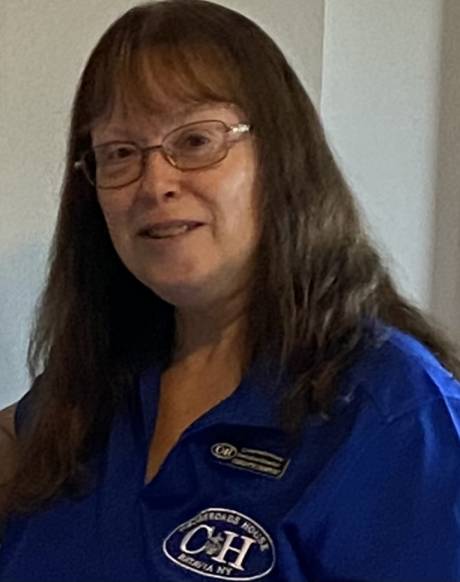
“Everybody dies,” she said. “The hard part is not knowing what you don’t know, understanding that not eating is the dying process, for a family to know what they’re experiencing is normal. And it’s hard.”
And her other mission? To remain as executive director for as long as she can. She’s committed to the long haul, she said.
“I love the fact that I can come down here and talk to them, making sure they get what they need, making them feel like it’s their home too,” she said. “My goal has always been to help people, and my niche is medical. Everyone gets to be like family; I love that. This is home.”
Crawford credits founder Kathy Panepento for establishing in 1998 what surely will be her biggest legacy: an end-of-life comfort care home with the mission “to help you live your best life until your last breath.”
The biggest challenge so far, Crawford said, has been retaining a large core of volunteers for the round-the-clock resident care, plus helping with fundraising, housekeeping, property maintenance, office work, and gardening duties.
Other new staff includes Director of Development Vicki Johnson and Volunteer Coordinator Ashley Manuel. They will also be profiled in this series.
Top photo: Charlotte Crawford in one of her favorite places at Crossroads House -- a resident's room. Photos by Joanne Beck.
Sponsored Post: Win Garth Brooks tickets visit Crossroadshouse.com today

Click here for more information and a chance to win!
Charlotte Crawford named Crossroads House director
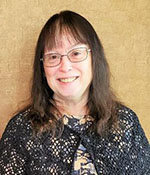
The Crossroads House Board of Directors is pleased to announce the appointment of Charlotte Crawford as their new Executive Director, effective immediately. Charlotte has been serving as the interim Executive Director following the departure of Jeff Allen.
A native of Western New York, Charlotte has worked as a nurse in many areas such as: physician’s offices, nursing homes, and hospitals. In addition to teaching Nursing Leadership at GCC, she also continues to serve as a NYS Certified Paramedic. Her last 22 years were spent at Lake Plains Community Care Network (LPCCN), a rural health network covering Orleans, Genesee, and Wyoming Counties. She began her employment as the Care Management Developer, followed by Associate Director, and the last 6 years as the CEO.
Charlotte met Kathy Panepento, the founder of Crossroads House, many years ago when Crossroads House was just a dream. Little did she know that fifteen years later her father would become a resident in the home. It was then that the mission of comfort care became very near and dear to her heart; however, she did not become actively involved until 2 ½ years ago when she was invited to become a member of the Board of Directors. In March of 2022, she was asked to fill in as the Interim Executive Director, and fell in love with Crossroads House, the mission, and all the amazing nurses, aides, and volunteers. Charlotte found their passion and dedication for everything they do to be contagious. “I am extremely excited to become a part of the talented administration team as we constantly strive to move Crossroads House forward to expand our offerings and services, and grow to better serve our community.”
Sponsored Post: Join the team at Crossroads House

Click here for job descriptions and applications.




